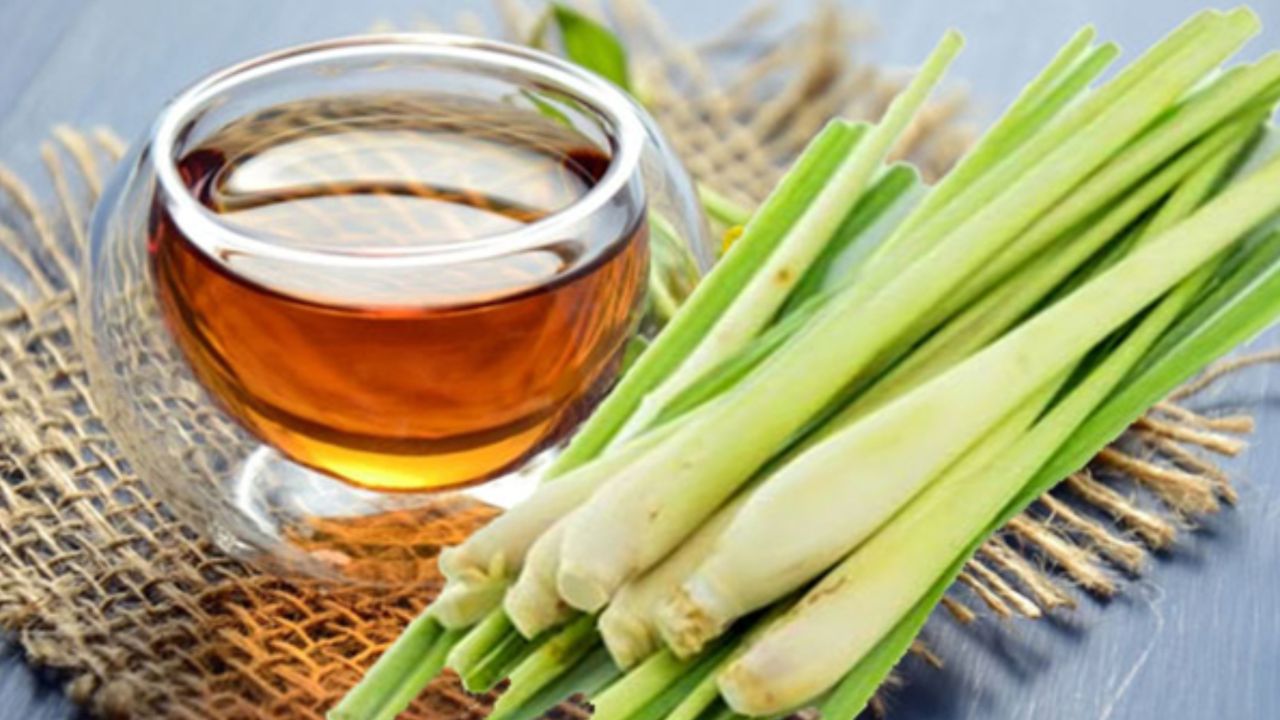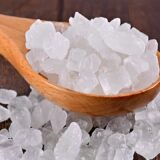Gavati Chaha In English: Health Benefits, Uses & Side Effects
“Gavati Chaha”, known as Lemongrass in English, is a perennial plant native to India, the Philippines, Malaysia, Indonesia, and various tropical regions of Asia. This magnificent herb boasts a lemon-like taste and fragrance, making it a highly valued ingredient. It’s widely embraced in Asian cuisine as a flavorful herb. With its delicate citrus flavor, lemongrass can be either dried and ground into powder or used in its fresh form. Lemongrass falls under the subfamily of approximately 55 grass species, belonging to the Cymbopogon citrates species.
It’s widely embraced in Asian cuisine as a flavorful herb. With its delicate citrus flavor, lemongrass can be either dried and ground into powder or used in its fresh form. Lemongrass falls under the subfamily of approximately 55 grass species, belonging to the Cymbopogon citrates species.
It thrives in warm temperate and tropical climates. Among its various names, you’ll find lemongrass, citronella grass, barbed-wire grass, silky heads, herb Luisa tangled, fever grass, and of course, gavati chaha, to name a few. In Indian Ayurveda, it is recognized as (गंधत्रिण) Gandhatrina.”
What is Gavati Chaha?
Lemongrass, also known as Gavati Chaha, is a tall, stalky plant characterized by its fresh, lemony aroma and citrus flavor. It is commonly used as an ingredient in Thai cuisine and is recognized for its insect-repellent properties.
Lemongrass essential oil is utilized in aromatherapy to invigorate the air, alleviate stress, and elevate mood. Beyond its culinary and aromatic uses, lemongrass has been employed as a traditional remedy to aid in sleep promotion, alleviate pain, and enhance the immune system.
One of the most popular methods of enjoying the benefits of lemongrass is by consuming it in the form of tea. Continue reading to discover how drinking lemongrass tea may offer these potential health advantages.
Nutritional Profile of (Lemongrass Tea) Gavati Cha Ha
The nutritional profile for lemongrass based on a serving size of 67 grams:
Calories: Approximately 6 kcal
- Carbohydrates: Approximately 1.5g
- Dietary Fiber: Approximately 0.2g
- Sugars: Approximately 0.2g
- Protein: Approximately 0.2g
- Fat: Approximately 0.1g
- Saturated Fat: Approximately 0g
Vitamins and Minerals:
- Vitamin C: Approximately 1.8mg (3% of daily recommended intake)
- Vitamin A: Approximately 11.7mcg (1% of daily recommended intake)
- Folate: Approximately 2.0mcg (1% of daily recommended intake)
- Potassium: Approximately 33.6mg (1% of daily recommended intake)
- Magnesium: Approximately 2.0mg (1% of daily recommended intake)
Note: The nutritional values provided are approximate and can vary based on factors such as the specific variety of lemongrass and growing conditions. Lemongrass is often used as an aromatic and flavoring agent in cooking and beverages, so its nutritional contribution may vary when consumed in different forms.
Top 10 Benefits of Gavati Cha Ha
Lemongrass, a versatile herb renowned for its refreshing citrus aroma and tangy flavor, offers an array of potential health benefits.
Widely utilized in various culinary traditions and holistic practices, lemongrass has garnered attention for its digestive aid, immune-boosting, and relaxation-inducing properties. Below are some of the benefits of lemongrass or so-called “Gavati Chaha”.
1. Digestive Health
Lemongrass contains citral, a compound known to stimulate the production of digestive enzymes in the stomach. These enzymes aid in the breakdown of food, reducing common digestive discomforts like bloating, gas, and indigestion. Moreover, lemongrass’s antimicrobial properties can help maintain a balanced gut microbiome, promoting a healthier digestive tract.
2. Anti-Inflammatory
Lemongrass is a rich source of antioxidants, including flavonoids and phenolic compounds. These antioxidants combat inflammation by neutralizing harmful free radicals in the body. By mitigating inflammation, lemongrass may contribute to a decreased risk of chronic diseases such as cardiovascular issues, arthritis, and certain cancers.
3. Antioxidant Support
Lemongrass contains various antioxidants like vitamins C and A, as well as chlorogenic acid. These antioxidants play a crucial role in preventing oxidative stress, which can damage cells and contribute to the development of diseases. By safeguarding cells from damage, lemongrass supports overall well-being and potentially lowers the likelihood of conditions like heart disease and certain cancers.
4. Immune System Boost
Lemongrass is abundant in essential vitamins and minerals, especially vitamin C. Vitamin C is renowned for its immune-boosting properties, as it enhances the function of white blood cells that combat infections. The regular consumption of lemongrass can provide a natural way to fortify the body’s defenses against illnesses.
5. Calming Effects
The aroma of lemongrass has a calming influence on the nervous system. This effect is attributed to compounds like citronellal, which can reduce anxiety and stress. Utilizing lemongrass essential oil in aromatherapy or even sipping lemongrass tea can foster relaxation, improve mood, and alleviate tension.
6. Skin Health
Lemongrass essential oil boasts potent antimicrobial and antifungal characteristics. These properties make it an asset in skincare routines, potentially combatting microbes responsible for acne and fungal skin issues. Diluted lemongrass oil can be applied topically to the skin, assisting in cleansing and promoting a clearer, more radiant complexion.
7. Cholesterol Regulation
Studies suggest that lemongrass may contribute to the reduction of LDL cholesterol levels (often referred to as “bad” cholesterol) and triglycerides. This cholesterol-lowering effect can have positive implications for heart health, reducing the risk of cardiovascular diseases and supporting overall cardiovascular well-being.
8. Detoxification
Lemongrass tea is thought to possess detoxifying properties due to its diuretic nature. This encourages increased urine production, aiding in the elimination of toxins and waste products from the body. This detoxification process can enhance the functioning of the liver and kidneys, integral organs for detoxification.
9. Pain Relief
Lemongrass oil contains compounds such as myrcene and citronellol, which exhibit analgesic properties. These compounds can potentially provide relief from muscular discomfort and headaches when the oil is diluted and applied topically to affected areas.
10. Antibacterial Properties
Lemongrass contains citral and limonene, compounds known for their natural antibacterial and antimicrobial effects. Incorporating lemongrass-infused products into daily routines or consuming lemongrass tea might contribute to preventing bacterial infections, particularly in the oral cavity, which can enhance overall oral health.
What Are the Common Uses of Lemon Grass?
Below are some of the potential uses and effects of lemongrass:
1. Dandruff: Early research indicates that applying a solution of lemongrass oil to the hair may help reduce dandruff in some individuals. The antimicrobial and antifungal properties of lemongrass could contribute to this effect by addressing the underlying causes of dandruff.
2. High Cholesterol: Early research suggests that taking lemongrass oil orally does not significantly reduce cholesterol levels in individuals with high cholesterol. While lemongrass contains compounds that may have potential cholesterol-lowering effects, further research is needed to establish its efficacy for this purpose.
3. Rheumatoid Arthritis (RA): Preliminary research suggests that applying lemongrass oil topically to the skin can potentially reduce pain in adults with rheumatoid arthritis (RA). However, more comprehensive studies are required to determine whether this effect is more than a placebo response.
4. Yeast Infection in the Mouth (Thrush): Initial studies suggest that drinking lemongrass tea might alleviate symptoms of thrush in individuals with HIV/AIDS. The antifungal properties of lemongrass could contribute to its potential effectiveness in managing thrush.
5. Stomach and Intestinal Cramps, Stomach Ache: Lemongrass is believed to possess soothing properties that might help alleviate stomach and intestinal cramps as well as general stomach discomfort.
6. High Blood Pressure: There is limited evidence to suggest that lemongrass could potentially contribute to managing high blood pressure. However, more research is required to establish its effectiveness and safety in this regard.
7. Convulsions: Some traditional practices involve using lemongrass for its potential anticonvulsant properties, which could be due to its various bioactive compounds. However, more research is needed to determine its efficacy in managing convulsions.
8. Pain and Swelling: Lemongrass’s potential anti-inflammatory and analgesic properties might contribute to its use in managing pain and swelling. However, more research is necessary to establish its effectiveness for these purposes.
9. Vomiting: Lemongrass has been used traditionally to alleviate vomiting. Its aromatic properties and potential antiemetic effects could be attributed to this application.
10. Cough, Achy Joints (Rheumatism), Fever, Common Cold: Lemongrass is used in traditional medicine for various ailments, including cough, achy joints, fever, and the common cold. These uses are based on their potential antioxidant, anti-inflammatory, and immune-boosting properties.
11. Diabetes: Some preliminary research suggests that lemongrass might have potential benefits for diabetes management, possibly due to its ability to improve insulin sensitivity and reduce blood sugar levels. However, further studies are needed to confirm these effects.
12. Exhaustion, Headache: Lemongrass’s uplifting aroma and potential calming effects have led to its use in traditional medicine for addressing exhaustion and headaches.
13. Use as an Antiseptic and Astringent: Lemongrass is known for its antiseptic properties, which could make it useful for cleaning and disinfecting wounds. Additionally, its astringent properties might aid in reducing excess oil on the skin.
Side effects of (lemongrass tea) Gavati cha ha
Lemongrass is generally considered safe when used in the amounts commonly found in foods, including the quantity typically used to prepare tea. However, it’s important to be aware of potential side effects and risks that can arise in some individuals:
1. Dizziness: Some individuals may experience feelings of dizziness after consuming lemongrass or lemongrass products. If you notice this symptom, it’s advisable to discontinue use and consult a healthcare professional.
2. Increased Hunger: In certain cases, lemongrass consumption might lead to an increase in hunger. This sensation could potentially disrupt eating habits, so be mindful of your body’s response.
3. Dry Mouth: Dry mouth is a possible side effect of lemongrass consumption. This discomfort might be alleviated by staying well-hydrated.
4. Increased Urination: Lemongrass can act as a diuretic, prompting increased urination. While this can help flush out toxins, excessive urination may lead to dehydration if fluids are not replenished adequately.
5. Tiredness: Some individuals might experience tiredness or fatigue after consuming lemongrass. If you find yourself feeling unusually tired, consider whether lemongrass consumption could be a contributing factor.
Allergic Reactions
Certain people may have an allergic reaction to lemongrass. If you encounter symptoms like rash, itching, difficulty breathing, or a rapid heart rate after coming into contact with or consuming lemongrass, it could be indicative of an allergic response. In such cases, seek emergency medical assistance promptly.
Specific Groups to Avoid Lemongrass Tea
If you fall into any of the following categories, it’s recommended that you avoid consuming lemongrass tea:
Pregnant: Pregnant individuals should avoid lemongrass tea due to its potential effects on uterine stimulation, which could pose risks during pregnancy.
Taking Prescription Diuretics: If you are prescribed diuretic medications, which are commonly referred to as “water pills” and are used to increase urine production, it’s best to avoid lemongrass tea. The combined effects of diuretics and lemongrass’s natural diuretic properties could lead to excessive fluid loss and electrolyte imbalances.
Low Heart Rate: Individuals with a low heart rate should steer clear of lemongrass tea, as it may further lower heart rate levels.
Low Potassium Levels: Lemongrass tea should be avoided by those with low potassium levels, as it could potentially exacerbate this condition.
Note: lemongrass offers various benefits; it’s important to be aware of potential side effects, especially if you belong to any of the mentioned groups or notice adverse reactions.
FAQ’s
1. What is Gavati Chaha called in English?
Gavati Chaha, also known as lemongrass in English, is a herbal infusion made from the leaves of the lemongrass plant (Cymbopogon citratus). It is a popular beverage known for its refreshing flavor and potential health benefits.
2. How is Gavati Chaha prepared?
To prepare Gavati Chaha, fresh or dried lemongrass leaves are steeped in hot water, much like traditional tea. The leaves release their aromatic oils and flavors, resulting in a fragrant and flavorful herbal tea.
3. What does Gavati Chaha taste like?
Gavati Chaha has a distinct citrusy and lemony flavor due to the presence of citral, a compound found in lemongrass. It offers a refreshing and soothing taste, often enjoyed with honey or other natural sweeteners.
4. What are the potential health benefits of Gavati Chaha?
Gavati Chaha is believed to offer several potential health benefits, including aiding digestion, reducing inflammation, boosting the immune system, and promoting relaxation. It is also valued for its potential antibacterial and antioxidant properties.
5. Is Gavati Chaha caffeine-free?
Yes, Gavati Chaha is naturally caffeine-free since it is an herbal infusion made from lemongrass leaves. This makes it a suitable choice for those looking to avoid caffeine.
6. Can Gavati Chaha help with weight loss?
Gavati Chaha is often consumed as a low-calorie beverage and is believed to support digestion and metabolism. However, while it might be a part of a healthy diet, it is not a direct solution for weight loss on its own.
7. How should Gavati Chaha be consumed?
Gavati Chaha can be enjoyed either hot or cold, depending on your preference. It is often served plain or with a touch of honey, lemon, or other natural sweeteners. Some people also choose to add herbs like ginger or mint for additional flavor.
8. Are there any side effects or precautions when consuming Gavati Chaha?
Gavati Chaha is generally considered safe when consumed in moderation. However, some people might experience side effects like dizziness, increased hunger, dry mouth, or increased urination. If you’re allergic to lemongrass, you might experience rash, itching, difficulty breathing, or a rapid heart rate. Pregnant individuals, those on prescription diuretics, people with low heart rates, and those with low potassium levels should avoid consuming Gavati Chaha.
9. Can Gavati Chaha interact with medications?
Certain medications, particularly those affecting heart rate or potassium levels, might interact with Gavati Chaha. It’s recommended to consult a healthcare professional if you have concerns about potential interactions with your medications.
10. Where can I find Gavati Chaha?
Gavati Chaha can often be found in health food stores, specialty tea shops, or online retailers. You can also prepare it at home using fresh or dried lemongrass leaves.
If you’re considering using lemongrass for its potential health benefits, it’s advisable to consult with a healthcare professional for personalized guidance, especially if you have existing medical conditions or are taking medications.
References:
- Lemon grass (Cymbopogon citratus) essential oil as a potent anti-inflammatory and antifungal drugs(1)
- The in vitro antimicrobial activity of Cymbopogon essential oil (lemon grass) and its interaction with silver ions(2)
- Investigation of the Mechanisms Underlying the Gastroprotective Effect of Cymbopogon Citratus Essential Oil(3)
- Antimicrobial activity of commercially available essential oils against Streptococcus mutans(4)
- Cholesterol reduction and lack of genotoxic or toxic effects in mice after repeated 21-day oral intake of lemongrass (Cymbopogon citratus) essential oil(5)

























